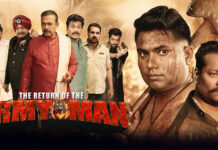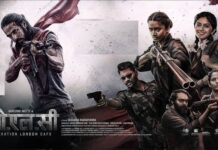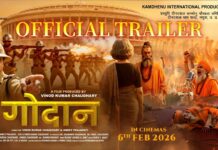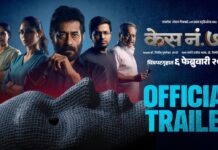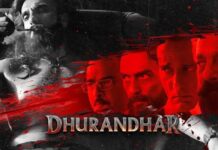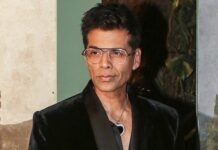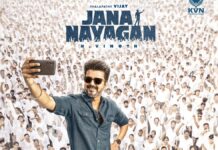Eros International, Dharma Productions and Excel Entertainment’s Baar Baar Dekho (UA) is a story about time travel.
Jai Varma (Sidharth Malhotra) and Diya Kapoor (Katrina Kaif) have been childhood friends. Friendship has turned into love. Jai, now a renowned Mathematics professor, is very particular about his career, and he has no time for other things. To him, anything that is logical is right, nothing else matters. He wants to teach in a foreign university and that’s his dream. Hence he is not very happy when Diya proposes to him; he feels, his focus would shift if he got married. But he finally relents.
Just before marriage, he gets a job offer from Cambridge University in London and he is overjoyed. He doesn’t accept the offer as he is in the midst of his wedding celebrations. A day before the wedding, Diya takes him to a new house, which would be their abode post-marriage. That’s when Jai realises that while he wanted to settle in London, Diya wanted to be in India and only India. They have a major argument and Jai even tells Diya that he wants to call off the marriage as he can’t ruin his future prospects.
Jai passes out after having champagne but when he wakes up the next day, he finds himself honeymooning with Diya in Thailand. He is shocked because he doesn’t remember getting married to Diya. However, Diya reminds him that they were now a legally-wedded couple and were on their honeymoon in Thailand. After sleeping again, Jai wakes up in London. In this way, he realises that he has jumped several days, weeks, months and even years in time. A time comes when he is in his forties, and he has two children, a son and a daughter. He is confused as hell and soon reasons out that he is probably able to foresee the highlights of the future. He feels, all what is happening to him is the doing of the priest who was to solemnise his marriage. This is because the priest had explained to the couple the meaning of the wedding vows which they would be taking. Jai meets the wedding priest who tells him, quite philosophically, that everything that’s happening to him was in his own hands and it was his own doing. That does it. Jai is able to return back in time and correct matters. He keeps returning back in time at intervals and sets right things that he has done wrong. In the future, Jai sees his wife seeking divorce from him, and another man marrying her. He also sees that his mother has passed away.
What happens in the end? Does Jai marry Diya or not?
Sri Rao’s story may be novel but it is too confusing for the Indian audience to digest. The viewer doesn’t understand whether Jai is actually transported in the future or it is his dream or just his imagination. Again, going back and forth only serves to confuse the audience even more. Although it is a love story, the viewer is hardly concerned about the two lovers and their separation/divorce. This is because he (viewer) is so confused about what’s happening that he doesn’t get the time to empathise with the characters. Even otherwise, the story doesn’t make the character of Jai and Diya lovable enough. The screenplay, penned by Sri Rao, Nitya Mehra and Anuvab Pal, is no better than the confusing story. Since the drama is of the kind the Hindi audience hasn’t seen before, explaining every aspect of it was what was needed. But the screenplay simply doesn’t attempt to do that and only serves to confuse the audience even more than the story. The philosophy that one can be cautious if one is aware of the future is so obvious that one wonders what the film is trying to convey besides the very, very obvious. Getting the priest in the drama at regular intervals may have been done to make matters simpler but the purpose is hardly achieved. Again, repeating the same scene, as the starting point, every time Jai goes back in time, not just becomes confusing but also irritating for the audience. The light scenes are so weak that the comedy often falls flat on its face. Emotions are conspicuous by their absence. Romance is far from being heart-warming. As a result, the writers appear to be trying too hard to impress with a screenplay which goes over people’s heads. Anvita Dutt’s dialogues are not too impressive.
Sidharth Malhotra does only a fair job and seems to be miscast in a role which required a far more seasoned actor. He looks handsome. Katrina Kaif’s acting is average. Although she looks hot, sexy and beautiful, she is given more than she can shoulder. She has been made to unnecessarily scream in normal scenes. Her dances are supremely graceful. Besides the lead pair, no actor gets any great scope. Sarika, as Jai’s mother, is ordinary. Ram Kapoor looks like he is playing a character he has played in several films earlier. He hardly adds anything to the character of Diya’s father. Sayani Gupta is earnest as Jai’s friend, Chitra. Rohan Joshi is quite nice as Chitra’s husband, Raj. Taaha Shah Badusha is so-so as Jai’s younger brother; he gets almost nil scope. Rajit Kapur makes his presence felt in a special appearance, as the priest. Alys Torrance ( as Diya’s mother) hardly has anything to do. Master Jason D’souza (as little Jai), baby Naisha Khanna (as little Diya), Faisal Batliwala (as young Jai), Tunisha Sharma (as young Diya), Shruti Gupta (as Shruti), Smriti Gupta (as Shreya), Kirti Adarkar (as Suman), Bhaskar Patel (as Prof. Dr. Ramamurthy), Varun Sharma (as Jai’s son, Arjun), master Abhishek Singh (as young Arjun), baby Naomi Costello (as Jai’s little daughter, Naina), Sagar Arya (as Nikhil Khanna), Hussina Raja (as the grown-up Naina), and others lend ordinary support.
Nitya Mehra’s direction leaves a lot to be desired. Her narration of the confusing script does nothing to simplify matters for the audience. Music of the film is the biggest plus point. At least four songs are hit/very appealing. ‘Nachde ne saare’ (composed by Jasleen Royal, penned by Aditya Sharma), ‘Sau aasmaan’ (music by Amaal Malik, written by Kumaar), Kaala chashma (original music by Prem Hardeep, recreated by Badshah, lyrics by Amrik Singh and Kumaar) and ‘Teri khair mangdi’ (composed by Bilal Saeed, written by Kumaar) are the best numbers. ‘Kho gaye hum kahan’ (composed by Jasleen Royal, written by Prateek Kuhad) and ‘Dariya’ (composed and penned by Arko) are also appealing songs. Song picturisations, especially of ‘Nachde ne saare’(Ganesh Acharya), ‘Sau aasmaan’ and ‘Kaala chashma’ (both by Bosco-Caesar) are excellent. Choreography of ‘Teri khair mangdi’(Atul Mongia) and ‘Dariya’ (Longines Fernandes) is okay. Background music (by Sameeruddin) is too intruding and loud. Ravi K. Chandran’s cinematography is excellent. Foreign locations are very eye-filling. Production designing (by Sharmistha Roy and Fali Unwalla) is of a high standard. Amitabh Shukla’s editing could’ve been better.
On the whole, Baar Baar Dekho is too confusing a film to be understood and enjoyed by the public. Despite hit music and a good-looking lead pair, the film will meet with a poor fate at the box-office. Its poor initial is another minus point.

